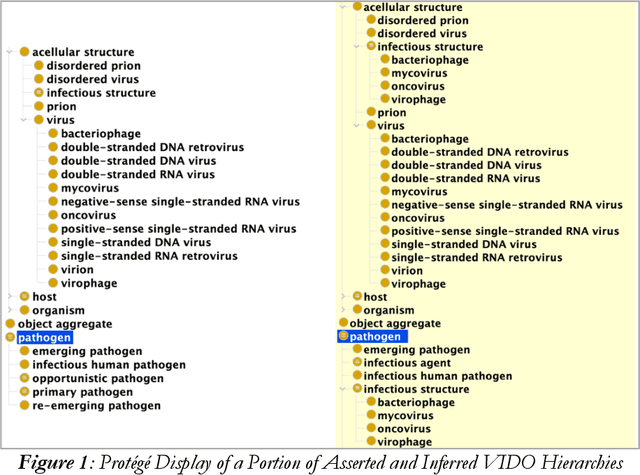Shane Babcock
A Fourfold Pathogen Reference Ontology Suite
Dec 31, 2024



Abstract:Infectious diseases remain a critical global health challenge, and the integration of standardized ontologies plays a vital role in managing related data. The Infectious Disease Ontology (IDO) and its extensions, such as the Coronavirus Infectious Disease Ontology (CIDO), are essential for organizing and disseminating information related to infectious diseases. The COVID-19 pandemic highlighted the need for updating IDO and its virus-specific extensions. There is an additional need to update IDO extensions specific to bacteria, fungus, and parasite infectious diseases. We adopt the "hub and spoke" methodology to generate pathogen-specific extensions of IDO: Virus Infectious Disease Ontology (VIDO), Bacteria Infectious Disease Ontology (BIDO), Mycosis Infectious Disease Ontology (MIDO), and Parasite Infectious Disease Ontology (PIDO). The creation of pathogen-specific reference ontologies advances modularization and reusability of infectious disease data within the IDO ecosystem. Future work will focus on further refining these ontologies, creating new extensions, and developing application ontologies based on them, in line with ongoing efforts to standardize biological and biomedical terminologies for improved data sharing and analysis.
Grounding Realizable Entities
Apr 30, 2024



Abstract:Ontological representations of qualities, dispositions, and roles have been refined over the past decade, clarifying subtle distinctions in life science research. After articulating a widely-used characterization of these entities within the context of Basic Formal Ontology (BFO), we identify gaps in this treatment and motivate the need for supplementing the BFO characterization. By way of supplement, we propose definitions for grounding relations holding between qualities and dispositions, and dispositions and roles, illustrating our proposal by representing subtle aspects of host-pathogen interactions.
 Add to Chrome
Add to Chrome Add to Firefox
Add to Firefox Add to Edge
Add to Edge